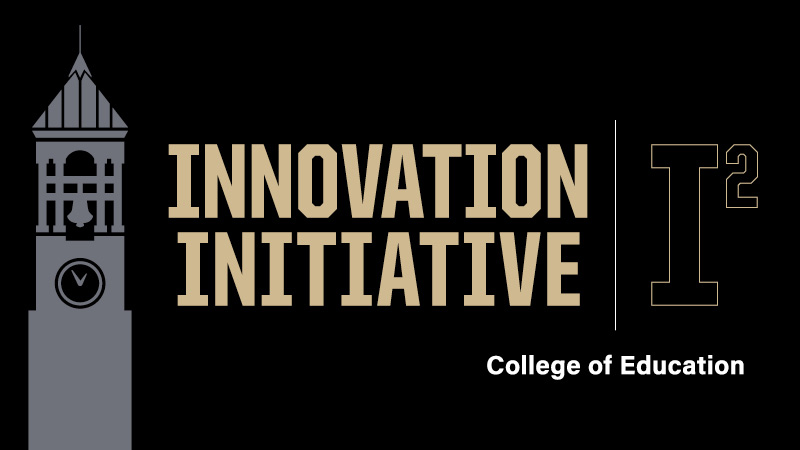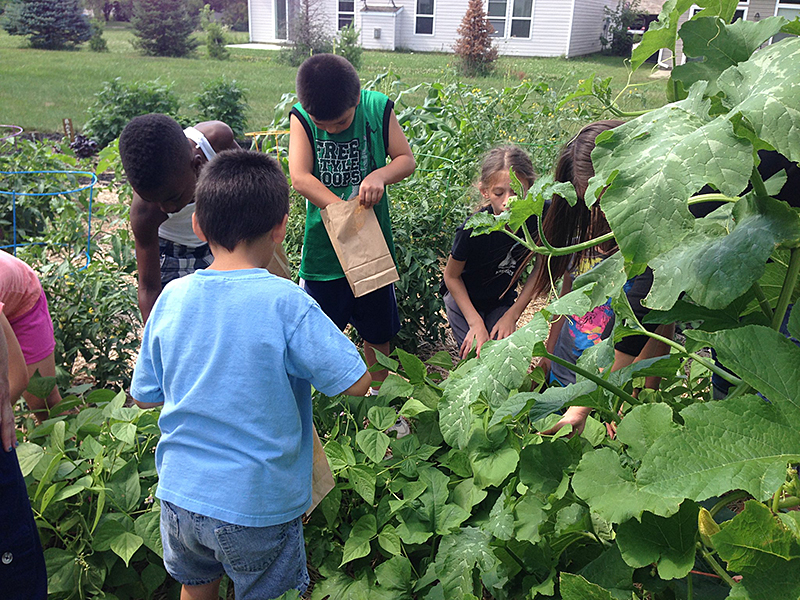September 23, 2021
In an evolving world, Purdue’s College of Education innovating new paths to success for K-12 teachers

WEST LAFAYETTE, Indiana – Make no mistake. The pandemic has set the table for seismic shifts in teaching methods in America’s elementary and secondary schools. But the need to evolve in a hypercompetitive and increasingly data- and technology-driven world has long been there.
A newly launched Purdue University College of Education program is responding to that change. Called the Innovation Initiative, or I2, the most comprehensive change in two decades to the teacher education curriculum, the program is designed to meet students more where they are. It addresses, among other things, how to teach students with disabilities. And those academically gifted. And those who are English language learners.
For teachers like TJ Rosa, who in the spring completed her first year of teaching at West Lafayette Intermediate School, it will be a huge help. She says being adaptable in changing circumstances and environments is key to successfully managing the classroom.
 Local students harvest produce as part of the summer garden and nutrition program of Heads Up at Country Villa in West Lafayette. (Photo provided)
Download image
Local students harvest produce as part of the summer garden and nutrition program of Heads Up at Country Villa in West Lafayette. (Photo provided)
Download image
“Especially during the pandemic, everything is changing all the time in schools,” says Rosa, a 2020 Purdue College of Education graduate and fourth-grade teacher. “Whether it's new procedures and guidelines, schedules, or students coming in and out of quarantine, teachers have to be flexible. Even without the added stress of COVID, being able to adapt and problem-solve quickly in the classroom is a valuable skill.”
Rosa says that students are also changing, and today’s classroom environments can present unexpected situations.
Guided by research and evidence, I2 launched this fall and is built on six hallmarks that will empower education majors with the tools and experiences they need to effectively educate all students while confidently navigating classroom environments.
Sustained and meaningful clinical experiences in P-12 schools, supported by university coursework, are essential in preparing teachers. I2 changes include field experiences each semester, combined with on-campus seminars, that culminate in an expanded student-teaching internship during the students’ final year, substantially expanding their instructional time in the classroom. One new clinical experience connects students to a community agency serving P-12 youth, expanding Purdue students’ knowledge of the rich and varied experiences that P-12 students bring to school.
Additional innovations include specific preparation for students to better meet the needs of all learners through new concentrations. All students will have coursework and experiences learning to better meet the education needs of students with disabilities, those with gifts, talents, and creativity, and English learners. Most students will choose one of these concentrations to more fully explore as a part of their four-year program. Choosing the English learner or students with gifts, talents, and creativity concentrations prepare students with the necessary knowledge and skills for an additional teaching license in those areas. Alternatively, students can choose a concentration in applied behavior analysis ,which will provide them with specialized skills needed for applying behavior analytic procedures to teach new behaviors and skills and decrease undesired behaviors in school settings.
“An additional exciting innovation is that all teacher education students will now meet the requirements for an Indiana additional license in online/blended teaching,” says Kathryn Obenchain, associate dean for learning, engagement and global initiatives in the College of Education and professor of social studies education.
Obenchain says that preparation for the additional license is seamlessly integrated through students’ four-year program.
“Here is an example of what this could mean. If a student chooses to major in elementary education at Purdue, they will choose a concentration—say English learners,” she says. “That means that upon successful completion of their four-year program and passing the state’s required licensure examinations, the student would have an initial teaching license in elementary education with add-on licenses in both teaching English learners and online/blended teaching, resulting in three licenses in a four-year program!”
Obenchain explains that a final innovation is the development of a mentoring program.
“We know that the first few years of teaching can be a challenge, so the College of Education is going to stay with our graduates, supporting them through a mentoring experience for the first two years of their teaching career,” she says.
Nancy Marchand-Martella, the Suzi and Dale Gallagher Dean of Purdue’s College of Education, notes, “With the Innovation Initiative, our graduates will be prepared with the knowledge and skills to better meet the evolving environment of P-12 schools. None of us know what the schools of tomorrow will look like, but Purdue graduates will be better prepared to address student needs and be capable partners with their fellow educators.”
Classrooms in the United States look much different and present more complex challenges for today’s teachers. From ever-changing technology to evolving classroom management best practices, teacher education candidates need the right tools to help them succeed in their first classroom and stay in the field of education.
"As a member of Purdue's Teacher Education Council, it was exciting as a P-12 public school superintendent to hear about these initiatives that will directly impact our schools,” says Colleen Moran, superintendent of Indiana’s North Montgomery Community School Corporation. “Ensuring that all teaching candidates will be placed in a field experience each semester is essential in their preservice training.”
Moran stresses the need for educators who are competent, caring and committed to teaching and learning, noting that the expansion of field experiences will provide opportunities to foster their growth before they enter the classroom as the teacher.
Based on groundbreaking faculty research and contributions of education experts at Purdue, and with input from K-12 administrators and Purdue teacher candidates, I2 is designed to prepare teachers to effectively educate each learner in every type of classroom.
"I am grateful for the work and dedication in creating the Innovation Initiative,” says Judi Hendrix, executive director of the Wabash Valley Education Center in West Lafayette. “A lot has changed in education over the past 20 years, and the Purdue College of Education listened to the needs from stakeholders while developing this initiative."
Community leaders anticipate I2 will support further development of the valuable relationships with Purdue teacher education students, providing them with an understanding of the learners they teach, not just the subjects they are teaching.
“Any opportunity to work with students is invaluable to both the at-risk student and the college student,” says Pauline Shen, community advocate and director of Heads-Up, a tutoring and mentoring program for low-income youth. “Measuring this outcome is almost impossible because it may be years before you see the result, but you have to start somewhere. The local community always benefits when college students learn about someone else, their environment, their lives, and what their struggle is with daily life. It teaches diversity, tolerance and the complexity of life to the college students, and it gives hope to the younger students.”
Undertaking a large-scale curricular reform was a tremendous task, Marchand-Martella says. Yet, the existing responsibilities of College of Education faculty and staff did not pause as they undertook this work. It was essential to provide a variety of support to faculty and staff for this additional and substantial effort.
Jay Akridge, Purdue’s provost and executive vice president for academic affairs and diversity, and a financial commitment from the College of Education allowed for the hire of two visiting professors in the first year of the I2. has enabled two education faculty members to work exclusively on innovation efforts.
“Provost Akridge and the College of Education demonstrated a clear investment in I2 and in teacher education at Purdue,” Obenchain says.
P-12 classroom teachers like Rosa believe that future Purdue Education graduates will be even better equipped to manage a variety of classroom experiences while supporting all learners.
“Kids are changing all the time, and they can always throw something at you that you weren't expecting,” Rosa says. “Technology can fail in the middle of a lesson, supplies can run out, and students can need more or less support than you may have planned for. Being able to go with the flow and model that for your students helps them in the present day and as they learn to be problem solvers themselves.”
Writer: Jennifer Merzdorf
Media Contact: Brian Huchel, 765-494-2084, bhuchel@purdue.edu
Sources: Nancy Marchand-Martella, nmarchand-martella@purdue.edu
Kathy Obenchain, kobench@purdue.edu
Jennifer Barce, jbarce@purdue.edu
Note to journalists: Journalists visiting campus should follow visitor health guidelines.

